Words: Colin Galloway
On October 23rd 1982 Malcolm Allison breezed into Ayresome Park to become the club’s new manager. After the disastrous reign of Bobby Murdoch, which had seen the club fall so dramatically from Division One to the foot of the Second Division in just 18 months, there was suddenly a new sense of optimism amongst the supporters. Allison was a surprise choice. Names linked were Don Revie, Tommy Docherty and even Brian Clough but the club opted for the Londoner.
‘Big Mal’ as he was known, was a headline making manager. Whether it was on the front pages or the back, he courted publicity wherever he went. He was a respected coach who had masterminded Manchester City’s league title in 1968. He had only recently returned from a stint in Portugal where he had won the league and cup double with Sporting Lisbon. He had left following a contract dispute. So why on earth had he chosen a debt-ridden side that were struggling at the foot of the Second Division?
Allison said at the time, “ Mike (McCullagh, Chairman) rang me and it started from there. I will have to see what is wrong and put it right. I am a good coach and good manager, the problem is the time factor. It could be quick, it could take a bit longer, we are always looking for a miracle.” He couldn’t wait to get started. The Monday following his appointment he went for a walkabout in Middlesbrough Town Centre to meet the fans and was mobbed. He was trying to get them back to Ayresome, where the attendances were steadily in decline. The club was losing £12,000 per week.
October 23rd, 1982 ‘Big Mal’ waves to the crowd before the start of the home game with QPR.
Following the dismissal of Murdoch, club stalwart Harold Shepherdson had stepped in as caretaker manager and steadied the ship. A win and two draws (plus narrow league cup defeat), had improved things but the team was still at the foot of the table. Allison was introduced to the crowd before the home game with league leaders QPR. Having only been appointed in the previous 24 hours, Shepherdson took charge of the team.
Allison chose not to sit in the dug-out but opted for the director’s box. Whether it was his influence or not, the team produced a stirring comeback to defeat the league leaders 2-1. What a start! Allison was pleased with the result but he said there was a lot of work to do.
Three days later the new boss took charge of his first game, a League Cup second leg tie with Burnley. Boro were trailing 2-3 from the first leg. The Turf Moor side had already visited Ayresome in the season and had slaughtered Murdoch’s side 4-1. Boro were bright from the start and after seven minutes Terry Cochrane’s cross found an unmarked Ray Hankin, and the big striker headed home.
The team were guilty of squandering several chances and literally paid the penalty when 11 minutes from time Claret’s winger Kevin Young was tripped in the box by Mick Baxter. Brian Laws (who would join the club the following year) smashed home the spot-kick. After the game Allison said he was disappointed with the result but not disheartened. His plea for the fans to attend had worked with over 10,000 in attendance, the biggest crowd of the season.
The Allison effect had further impact with two wins and a draw in their next three games. He had brought in former England defender Kevin Beattie, whose career had been blighted by knee injuries. He had been on a week-to-week contract at Colchester United. It was a gamble but with little money to spend, Allison took a chance. He trusted Beattie who was made team captain. The player would be consulted on team selections, something which he later admitted he didn’t feel comfortable with. Sadly, Beattie, still only 29, would only make four league appearances that season as his knee problems worsened.
Having taken over a month earlier, this was the first squad photo of Allison and his new team. The picture was taken at the start of November, 1982.
Back – McClurg, Ross, Otto, Hankin, Tupling, Brownlie
Middle – Baxter, Mowbray, Ward, Macdonald, Nattrass, Currie, Wood, Angus, Bolton, Beattie
Front – Clayton (Physio), Cochrane, Bell, O’Hanlon, Allison, Platt, Kennedy, Shearer, Knowles (Coach)
After such a promising start, the team were brought back to earth with two thumping defeats. Blackburn’s 5-1 demolition of Boro at Ayresome was particularly demoralising. Leading by a goal at half time, Rovers then scored four times in 18 minutes to lead five-nil with winger Noel Brotherston running riot.
Seven days later, a trip to Molineux would end in a similar drubbing. They conceded three goals in the opening half hour eventually losing 4-0 to a rampant Wolves side. After the game Allison revealed that he had only 14 fit players and new signing Beattie was to have an operation on his knee. The team had dropped to 18th.
Big Mal rallied his wafer-thin squad and the team lost only once in their next nine league and cup games. Non-league Bishop Stortford had pulled off a shock draw at Ayresome in the FA Cup before a David Shearer double put them to the sword in the replay. The biggest home attendance for almost two years was present for the visit of Newcastle United. Over 25,000 were at the game as the two sides battled out a 1-1 draw.
Unable to bring players in, Allison had to rely on several home grown youngsters. Gary Gill, Gary Hamilton, Kelham O’Hanlon, Alan Roberts and Paul Ward were all introduced. Surprisingly, the manager cast both club captain Jim Platt and international winger Terry Cochrane to the reserves. Cochrane was fined by Allison for his antics in a game for the second string and both players would leave the club later in the year.
Throughout January and February, and up until late March, Allison’s men recorded only one league victory. The heaviest defeat was a 6-1 hammering at QPR.
Interestingly, the team wore a bizarre colour combo on the day. They had to borrow the home side’s second kit as the game was televised. TV Broadcasting rules didn’t allow teams to wear sponsored kits and Boro had only brought their ‘McLean Homes’ adorned shirts. The result was Boro took the field in orange shirts and red shorts.
Despite the league form, the FA Cup provided some respite with a fourth round victory over Notts County and then Boro managed to take First Division Arsenal to a replay before exiting the tournament.
The poor league form had left Boro in the relegation zone and two points from safety. With ten games remaining, Chairman McCullagh made an impassioned plea for the supporters to get behind the team and manager. Two consecutive victories were followed by two defeats.
The second of those defeats was against relegation rivals Derby County with the Rams scoring the winner two minutes from time. The bottom of the table was extremely tight and just one point separated 17th placed Crystal Palace from second bottom Burnley.
The next two games Boro gained creditable draws against second placed Wolves and away at Blackburn. However, in both games Boro should have taken all the points. Incredibly, Mick Kennedy missed from the spot in both games.
Boro had one of the better run-ins of the relegation pack with two of the final three games of the season at home.
An Easter Monday downpour had caused the game with Crystal Palace to be postponed. Boro remained in 17th but were only three points above second bottom Rotherham United. Cambridge United were the next visitors to Ayresome. The Teessiders dominated the game but found visitor’s keeper Malcolm Webster in outstanding form. Despite all the pressure, a slip by Irving Nattrass four minutes before half time allowed Robbie Cooke to head United ahead. Somehow the visitors held on for victory. Allison said after the match that his team’s fate would be decided in the next game against Crystal Palace who were a point ahead of his side.
Over 10,000 were in Ayresome on a warm Tuesday night for this crucial fixture. In a close first half Boro grabbed the lead four minutes before the break when Gary Hamilton’s deflected shot beat Palace keeper David Fry. Five minutes into the second half Darren Wood was brought down in the box to give his side a penalty. Mick Kennedy had missed the last two spot kicks and instead Heine Otto stepped up and coolly slotted the ball home. At the end of the game Allison was mobbed by the crowd. The manager said afterwards that the result was more important to him than winning the Portuguese Cup Final with Sporting Lisbon the previous summer. He praised his players highlighting the tough time they had gone through.
Although not mathematically certain, Boro were just about safe as they were three points above the relegation zone and had a better goal difference than most. Ironically, the final day saw Boro travel to Stamford Bridge to face Chelsea who also needed a point to be mathematically safe. The game was a bore draw and safety was confirmed (Boro would have survived without the final day point).
Allison had achieved his objective of keeping the club in the division, however it was a bit too close for comfort. The summer of 1983 saw no players coming in but seven experienced players would depart in the coming months, (Platt, Cochrane, Beattie, Bolton, Hankin, Brownlie, Shearer). The club had to rely on its youngsters.
The first team squad consisted of only 14 players, seven of which were teenagers. This was one of the smallest squads in the club’s history. Allison was still under pressure to sell. He realised that if there were any offers for any of his squad they would leave. Both Darren Wood and Stephen Bell were attracting the attention of several top flight clubs. The manager did make one signing though, bringing in ex Arsenal winger George Armstrong as first team coach.
Squad photograph for the 83/84 season. Four players had already left the club in the summer. Cochrane, Hankin and Platt would soon join them through the exit door. It left 14 professionals and two youngsters (Tupling and Gill) who were yet to sign a contract. The team wore a new kit which was made locally by Jack Hatfield sports.
Back – Hamilton, Tupling, Sugrue, Bell, Cochrane, Gill
Middle – Hankin, Currie, O’Hanlon, Mowbray, Platt, Otto, Baxter
Front – Ward, Wood, Macdonald, Allison, Armstrong, Nattrass, Roberts, Kennedy
The fixtures for the new season gave Boro a tough start with an opening day trip to newly promoted Portsmouth followed by home games with promotion favourites Leeds United and Newcastle United. Allison gave the centre forward role to 20 year old David Currie, a local youngster who had only made a handful of appearances. He didn’t have a lot of options. An opening day victory at Portsmouth courtesy of Heine Otto’s first half strike got the side off to an unexpected good start. But three days later Fourth Division Chesterfield shocked the Teessiders with a 1-0 win in the League Cup, scoring three minutes from time.
The visit of Leeds and their army of supporters bolstered the Ayresome crowd to 12,733. The Elland Road side took a two goal lead but a spirited last half hour saw Currie notch his first goals for the club to earn a point.
Next up were Newcastle with nearly 20,000 inside Ayresome for the midweek clash. There was a tremendous atmosphere in the ground as Boro more than matched their star-studded opponents.
Currie opened the scoring with a sublime twenty yard curling shot, before Kevin Keegan levelled. Boro were on the front-foot after the break and deservedly went ahead with a second Currie strike. With only eight minutes remaining former Boro striker David Mills levelled the scores. But Boro responded and after a searing run by Alan Roberts, his cross was driven home by Gary Hamilton to set off euphoric scenes. Allison was full of praise for the entertainment served up by his young side. Victory at Barnsley the following Saturday, put the team up to third place, a point behind leaders Sheffield Wednesday.
Allison’s impressive start to the season didn’t go unnoticed around the world. Portuguese second division side Belenenses wanted him as their new manager. The wages offered would have made him financially secure, but Allison turned down the offer stating he needed another 18 months to build the side he wanted at Middlesbrough.
Two draws were followed by five consecutive defeats as the frailties of Allison’s wafer-thin young squad were exposed. The team was desperate for new blood in the side and managed to recruit keeper Stephen Pears on loan from Manchester United and striker Andy Crawford who was playing non-league football after being released by Cardiff City.
Pears was an instant success and quickly became a fan’s favourite. He would go on to have two separate loan spells during the season. The team’s inconsistent form continued and by Christmas they were 15th in the table.
January brought the season’s highlight with a thrilling 3-2 FA Cup third round victory over Arsenal, Mick Baxter heading in the winner ten minutes from time. The biggest crowd of the season witnessed a 2-0 fourth round victory over Bournemouth. Sadly, the FA Cup dream ended at Meadow Lane when Notts County’s John Chiedozie scored the only goal of a close fought game. Boro were backed by a huge following from Teesside that day.
Article from the Club programme asking supporters to help fund the permanent transfer of Stephen Pears. The club had no transfer funds and were desperate to sign the keeper.
The FA Cup elimination signalled another dip in form with a six game winless run. The team dropped to 16th. Crowds tumbled down to 5,000. Allison was under constant pressure to sell players to balance the books. Things were bleak and there was no let up.
The club had appealed to supporters to help fund the transfer of Stephen Pears but sadly the target fell well short. Allison was by now at loggerheads with the board over the sale of players and following the home defeat by Fulham, he reiterated an earlier statement saying, ‘he would rather the club die than linger on.’ That was too much for Chairman McCullagh and the board. They had previously asked Allison to reconsider his position with regards to supporting the survival plans for the club however as he had repeated his feelings, the board had lost confidence in him and he was dismissed.
Allison seemed resigned to the situation and said, ‘Do I accept it? It’s always the same in this business, it’s just one of those things.’
McCullagh asked former manager Jack Charlton if he would return to the club on a caretaker basis to see them through until the end of the season. Charlton agreed to do it and refused to take any payment as he recognised the club’s fraught financial position.
The following week, the club did not publish a match programme for the game with Oldham Athletic. They produced a single sheet with the line-ups on one side and this chilling message from the Chairman on the other.
Under Charlton’s guidance, the team put together three wins and three draws in their remaining nine games to comfortably see off any threat of relegation. They finished in 17th position, seven points above the relegation places.
However, it was not on the field that the club faced it’s biggest fight. The debt was spiralling and it would prove to be the most testing time of their existence. The club was on the brink.
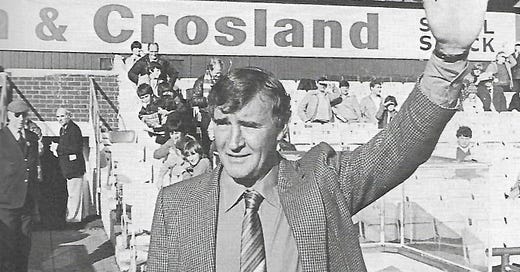



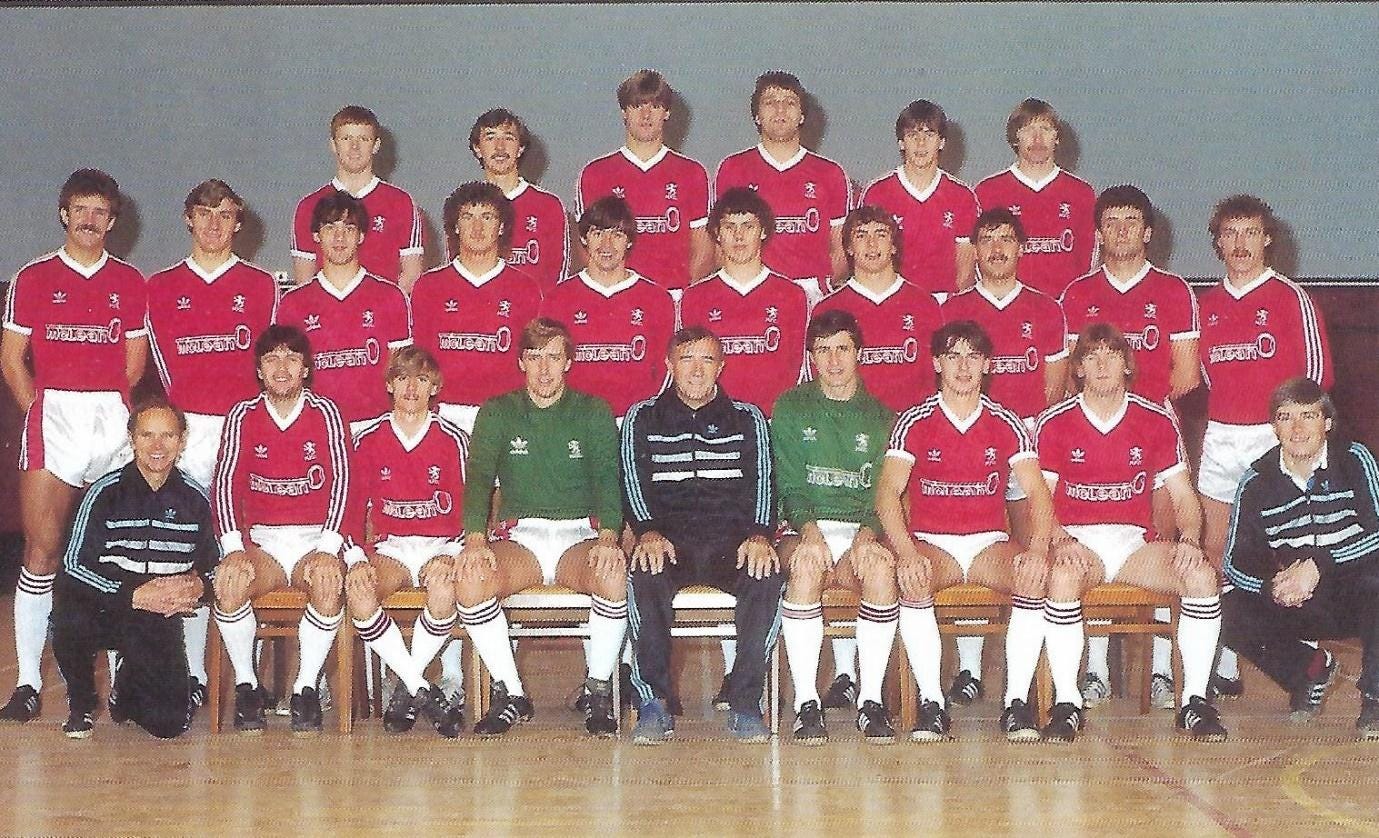
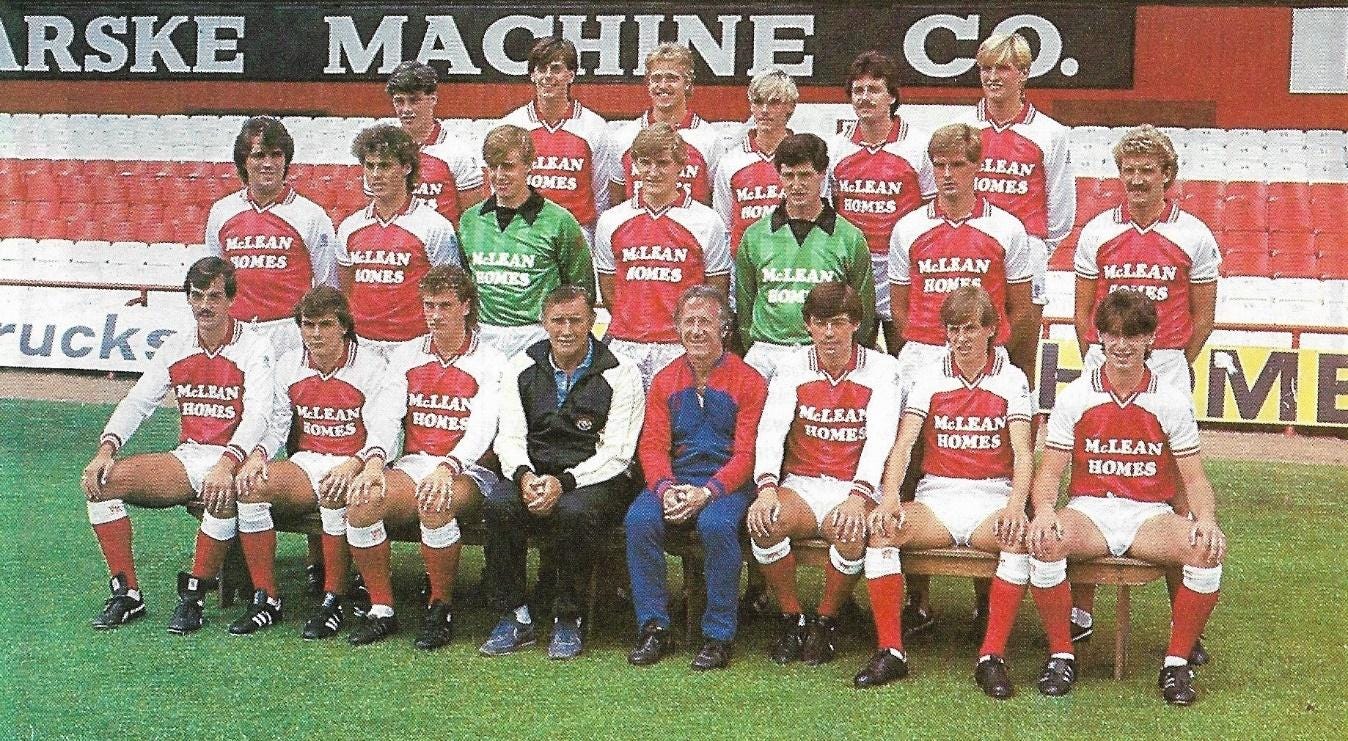
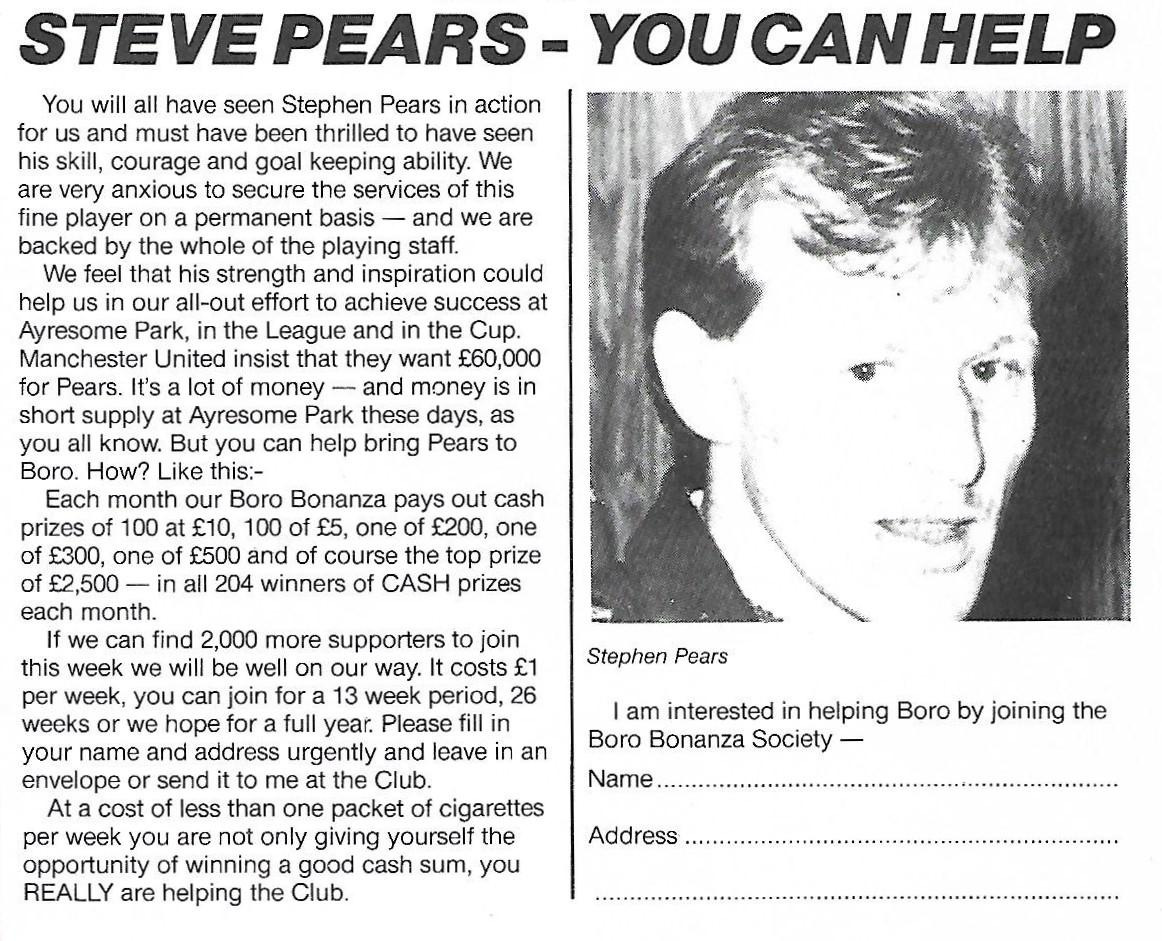
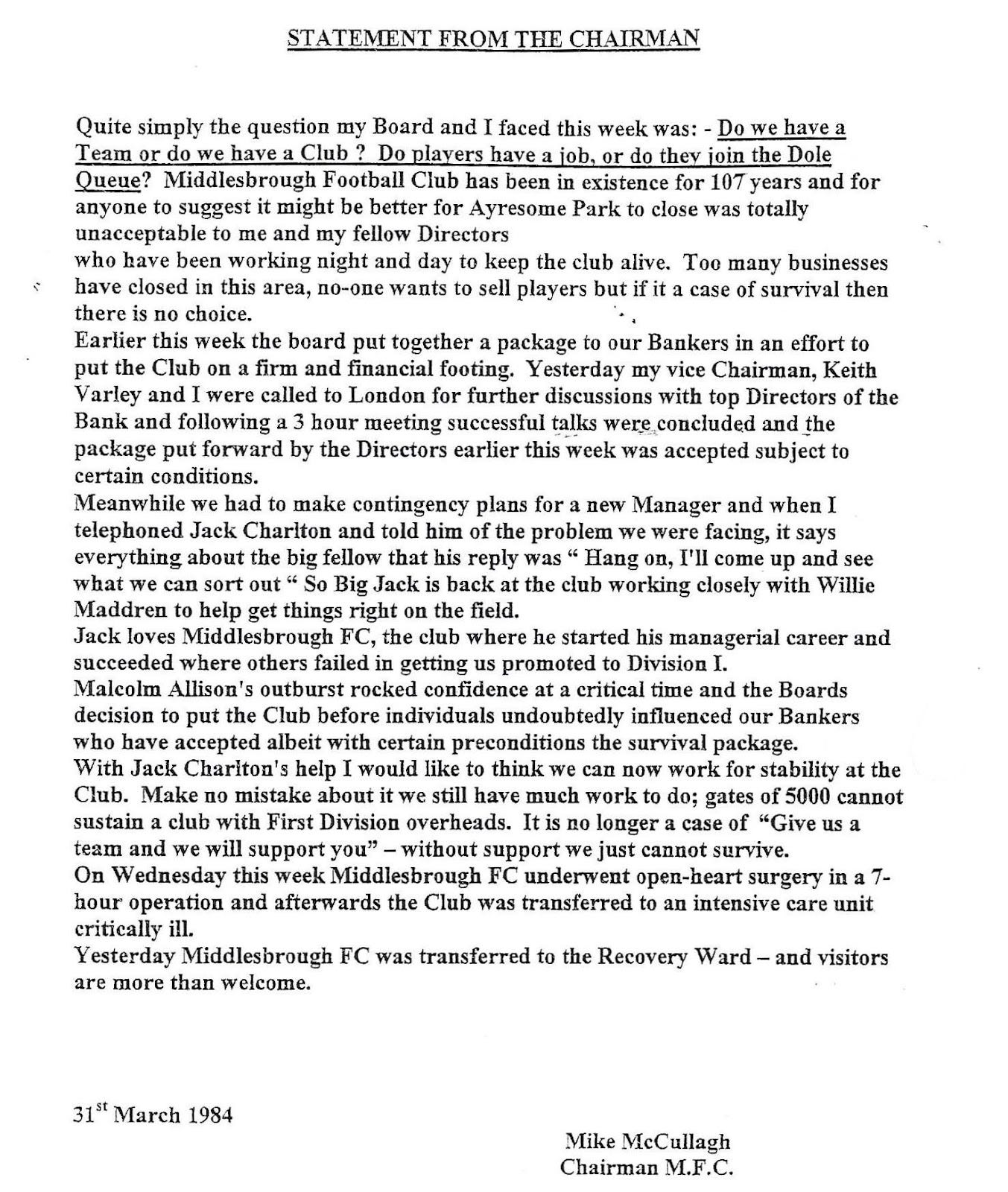
Thanks for this. I started supporting Boro 1982 so Big Mal arrived early on in my supporting 'career' and therefore look fondly on it despite the poor results. I just rememeber the Arsenal win.
Big Mal was a fascinating character. In some ways way ahead of his time looking at taking on board tips from other sports and looking at new ideas such as diet. When Strachan appointed a conditioning coach it was hailed as great progress but turns out Allison had employed him 30 years earlier! Gary Gill and some others, when he died, said Big Mal was possibly the best coach they'd had in their career, and how he spent time with the juniors, which most managers wouldn't. In contrast, as mentioned, he sidelined experienced players like Platt and Cochrane. He also seemed to try to get to fans involved, like with painting of Ayresome park by fans in summer 1983. Considering the financial constraints which limited the squad what he (and later maddran) achieved was considerable. He also had a guft of distracting attention from a poor performance with a bizarre quote, like suggesting rebranding as Cleveland Cowboys!
Sadly though in other ways he was from a past era, with his drinking. In the 1990s I spoke to a guy who said Big Mal lived in a flat about his uncle's pub, and was often seen the worse for wear in the pub.